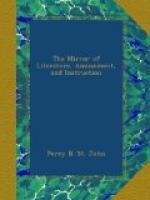R. Montgomery.
I stood in the light of the festive hall,
Gorgeously wrought was its pictured wall;
And the strings of the lute replied in song,
To the heart-breathed lays of the vocal throng.
Oh! rich were the odours that floated there,
O’er the swan-like neck and the bosom fair;
And roses were mingled with sparkling pearls,
On the marble brow, and the cluster’d curls.
I stood in that hall, and my lips were
mute,
And my spirit entranced with the elfin
lute;
And the eyes that look’d on me seem’d
fraught with love,
As the stars that make Night more divine
above.
A sorrowful thought o’er my spirit came,
Like thunder-clouds kindling with gloom and flame;
For I knew that those forms in the dust would lie,
And no passionate lips to their songs reply.
But the music recalled me, the hall glow’d with light,
And burst like a vision of heaven on my sight;
“Oh! thus,” I exclaimed, “will dark feelings depart,
When the sunshine of beauty descends on the heart!”
G.R. Carter.
* * * * *
TRAGEDY AND COMEDY.
It has been observed by an able and popular writer[2] of the present day, that the following proposition, though very generally received, is far from being a true one: “Tragedy improves and exalts the nature of man, while Comedy has a tendency to lower it.” Now I profess also to believe rather in the converse of this proposition, and shall endeavour in this essay to establish that belief in the minds of my readers, by the same line of argument that originally induced me to adopt it. With the generality of persons, who are not in the habit of reasoning upon subjects of this nature, this question would perhaps be decided, and the preference awarded to either species of the drama, according to the peculiar organization of each person: I mean, that those who are naturally grave, would be more gratified by being affected, and by having an appeal made to their feelings; while on the other hand, those who are of a freer temperament, and never dream of brooding over misfortune, would doubtless prefer being amused. If this remark carries any weight with it, egotism will be so far necessary to my argument, that I may be excused for saying thus much:—I suspect myself to be classed, by nature, under the first of these divisions, and am the more entitled to a fair hearing, because I argue against feeling and natural inclination.
[2] Lord John Russell.
Perhaps I shall be able to lay more clearly before the reader, my reasoning on this interesting as well as important subject, by considering Tragedy and Comedy respectively, under three distinct heads:—1st. with respect to the particular sphere or province of each; 2ndly, their plot and characters; and 3rdly, the end or design in view.




